Argentine Security Minister Patricia Bullrich asserted on Thursday that the Tren de Aragua transnational criminal organization has the “characteristics of terrorism,” and the criminal gang’s operations are “not autonomous” from that of Venezuela’s socialist regime.
Bullrich, who also said the Tren de Aragua’s objective is to “generate terror in the population,” made her assertions in remarks given during her participation in the 2024 edition of Chile’s National Entrepreneurship Encounter (ENADE), held in Santiago. Bullrich was accompanied by her Chilean counterpart, Carolina Tohá, and Colombia’s conservative former President Iván Duque.
“The Tren de Aragua does not strike in just any way. The Tren de Aragua strikes with a procedure, with a matrix of operation, with a logic that always does exactly the same thing,” Bullrich explained. “It settles in a certain place. It comes with a group in general of Venezuelan nationality.”
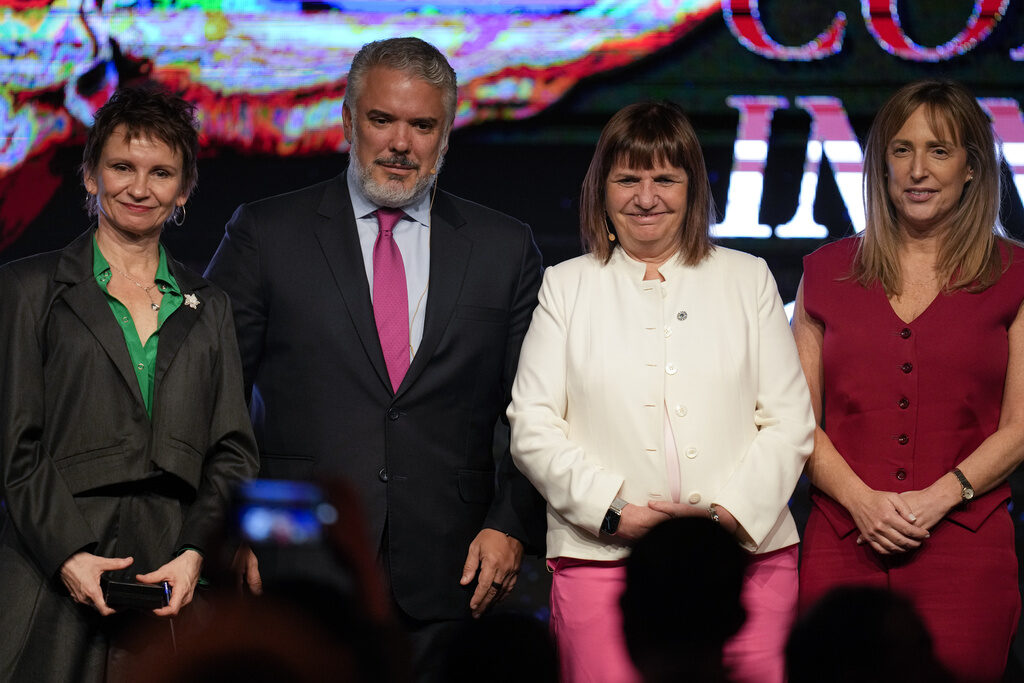
From left to right: Chile’s Interior and Security Minister Carolina Toha, Colombia’s former President Ivan Duque, Argentina’s Security Minister Patricia Bullrich, and President of the Chilean Institute of Rational Business Administration Karen Thal pose for a group photo during the annual National Meeting of Entrepreneurs in Santiago, Chile, on April 25, 2024. (AP Photo/Esteban Felix)
The Argentine security minister continued by explaining how the Tren de Aragua acts to settle and operate in other countries.
She stated:
They install themselves. They buy entire buildings, as it happened in Peru. They all live in those buildings so that they don’t know each other; they don’t know what conversation they may have. From there, they plan — with time, without haste — the shots they are going to take, but they are not random hits. It is not a matter of searching, attacking a bank, but rather, they are strikes that have the purpose of generating what I would call a criminal organization that has the characteristics of terrorism because the objective of the coup is to generate terror in the population. Terror means, as it happened here, with Ronald Ojeda.
Ojeda was a Venezuelan dissident and former member of the nation’s military who lived in Chile and had been granted asylum in December 2023. Ojeda was abducted on February 21 by a group of men that Chilean authorities have linked to the Tren de Aragua.
The men, who pretended to be members of Chile’s immigration police, abducted Ojeda from his residence in Santiago. Ojeda’s body was found ten days later buried inside a suitcase under a concrete structure. Chilean authorities determined in March that one of the men involved in Ojeda’s murder, 28-year-old Venezuelan citizen Walter de Jesús Rodríguez Pérez, was a former staff employee in the office of the governor of Venezuela’s Aragua state in 2015, three years after the eponymous criminal organization’s foundation in 2012.
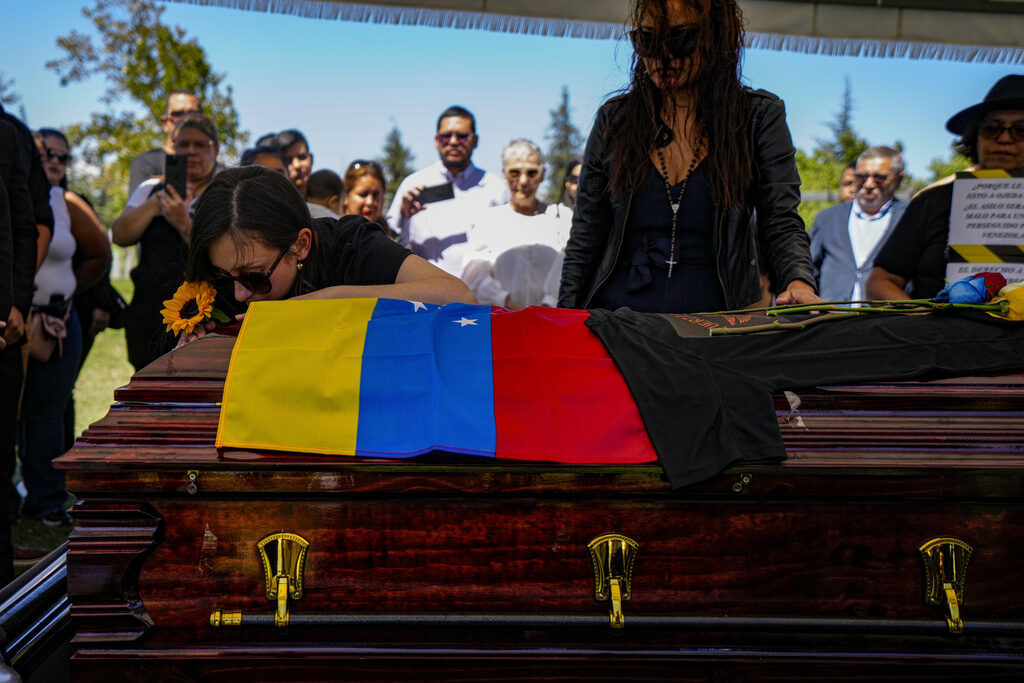
The widow and sister of former Venezuelan military officer Ronald Ojeda bury him at Canaan Cemetery in Santiago, Chile, on March 8, 2024. (AP Photo/Esteban Felix)
In addition to Ojeda’s case, Bullrich mentioned the case of Emmanuel Sánchez, a 27-year-old member of the Chilean law enforcement gendarmerie, the carabineros, who was shot dead on April 10 as he tried to repel an assault in Santiago while he was in his personal vehicle with his wife and three-year-old child. Sánchez received four bullet wounds in his attempt to thwart five criminals.
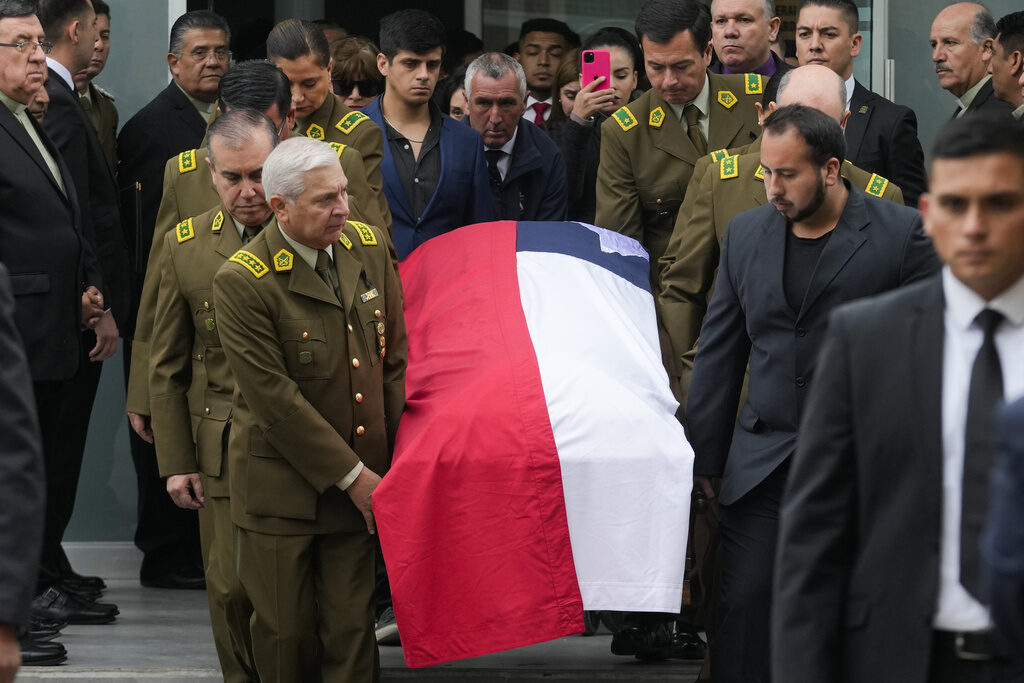
Chilean National Police Chief Gen. Ricardo Yanez (L) helps carry the coffin of police officer Emmanuel Sánchez from the police temple to the cemetery in Santiago, Chile, on April 12, 2024. (AP Photo/Esteban Felix)
Chilean authorities determined that the main suspect presumed to have shot Sánchez dead is Venezuelan citizen Dayonis Junior Orozco Castillo. Orozco had fled Chile and managed to travel across Bolivia, Peru, and Ecuador to reach Colombia to meet with his family before returning to Venezuela.
Colombian authorities captured Orozco on Wednesday thanks to information provided by Chilean authorities, who received approval for an Interpol “red notice” for his arrest. Colombia also used information obtained from the suspect’s social media accounts, which left a trail of his journey. At the time of his capture, the suspect carried a Venezuelan identity card with false information, and he had changed his appearance.
Colombian authorities are investigating if Orozco is a member of the Tren de Aragua. Chilean authorities are carrying out Orozco’s extradition proceedings at press time.
“That person who escaped crossed five countries. Can he cross five countries with an Interpol red card? No,” Bullrich said.
“Behind that, there is an organization with logistics that provides him with passports, false identities, frauds. Stolen passports so that from there he can escape and arrive, surely, again in Venezuela,” she continued.
Bullrich concluded her explanation by asserting that the Tren de Aragua’s activities are linked to Venezuela’s socialist regime, led by dictator Nicolás Maduro.

Venezuelan President Nicolás Maduro (Carlos Becerra/Bloomberg via Getty Images)
“Consequently, it is important to analyze whether it is an organization that is autonomous from the state or not autonomous from the state. I tend to think that it is not autonomous from the state,” Bullrich said.
“We, in Argentina, may have a view towards a regime that we consider authoritarian, but it is one thing to consider that a regime has authoritarian conditions,” Bullrich concluded, “and another thing to think that we could reach a really dangerous level if a state, as happened with Iran and Hezbollah in Argentina, was the one feeding this organized crime of the Tren de Aragua.”
The Maduro regime has repeatedly insisted that the Tren de Aragua “does not exist,” asserting that it is part of a “fictional” international narrative that purportedly seeks to hurt the rogue regime’s image. Venezuelan officials have also repeatedly claimed that the gang was “dismantled” — contradicting claims that it never existed — after security forces raided the Tocorón prison, an inmate facility located in the Venezuelan state of Aragua that served as the criminal organization’s main headquarters.
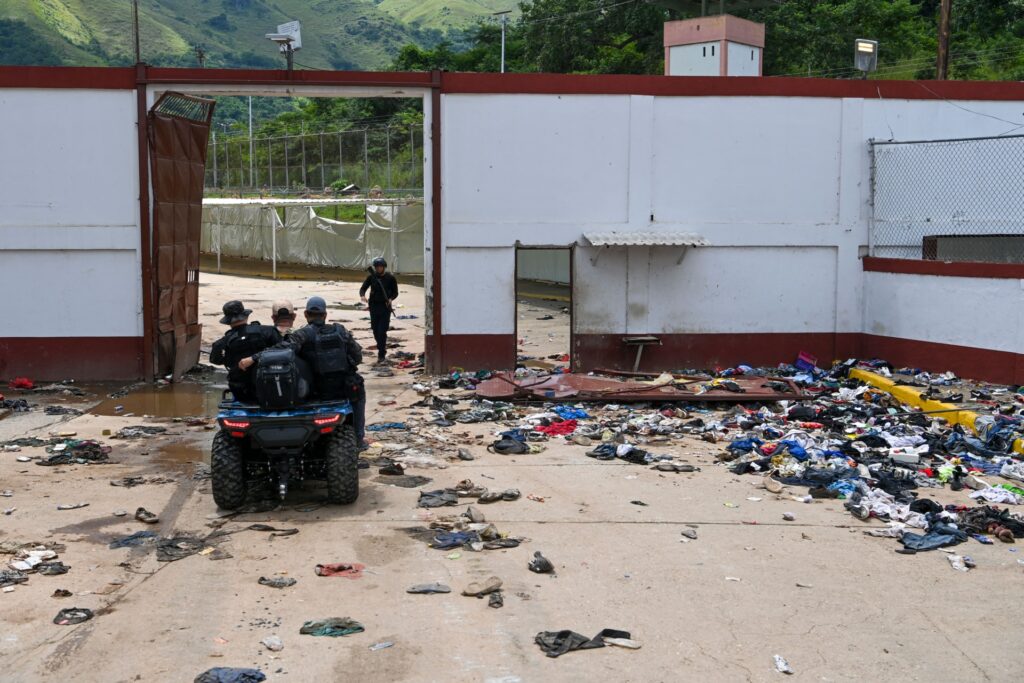
Members of the Bolivarian National Police patrol on a quad bike at the Tocorón prison in Aragua State, Venezuela, on September 23, 2023. (YURI CORTEZ/AFP via Getty Images)
It is largely believed that the group, which originally started in Venezuela as a local trade union gang in 2012, was able to rapidly grow into a full-fledged transnational criminal organization under the auspices of the Maduro regime. Evidence suggests that the raid on Tocorón prison only occurred after the socialist regime negotiated with the criminal organization, allowing its leader, Héctor “the Child” Guerrero, to safely flee from the facility beforehand. Guerrero’s whereabouts remain unknown.
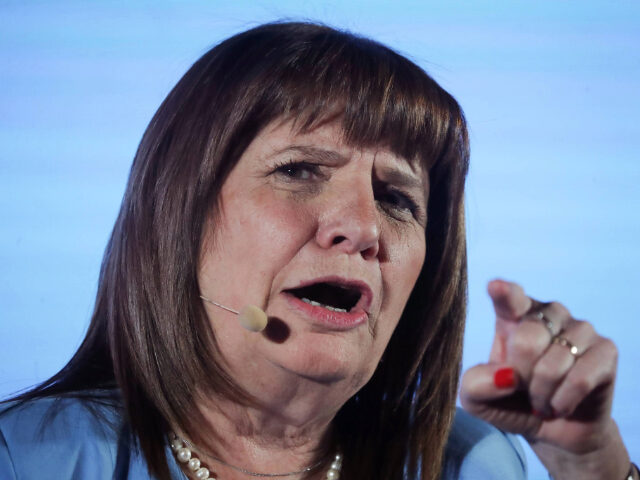
COMMENTS
Please let us know if you're having issues with commenting.